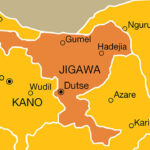The Chinese Communist Party (CCP) has become “increasingly sophisticated and active” in its efforts to influence European elections and policy-making, according to a recent study by the Association for International Affairs, a Prague-based think tank.
The report, released just days before the European Parliament election, highlights China’s growing involvement in electoral interference, a tactic more commonly associated with Russia.
Researchers found that China is employing various methods, including political influence and information manipulation to sway European elections and decision-making processes.
China’s attempts to influence European elections come as nearly 400 million voters across Europe prepare to head to the polls to elect lawmakers for the next five years.
- IITA to mitigate access to improved seeds
- Palestinians seek to join Gaza genocide case at World Court
The election results could potentially reshape the political landscape and shift attitudes toward China, affecting the European Union’s stance on foreign interference in democratic processes.
The report, authored by Kara Nemeckova and Ivana Karaskova, suggests that Beijing’s interference efforts are driven by its need for access to the European market to stimulate economic growth and acquire advanced technologies.
Amid rising tensions with Washington, the CCP views the EU as a potential ally if it can reduce its reliance on the United States.
Over the past decade, the CCP has engaged in cyber-enabled interventions in at least 10 elections across seven countries, primarily in the Asia-Pacific region. These interventions have included hacking voter databases, breaching parliamentary servers, and conducting spear-phishing attacks to gather intelligence.
The latest Czech report indicates that China’s electoral interference in Europe has become more complex, leveraging a variety of techniques from fostering political dialogues to engaging in acts of bribery and espionage.
Notably, the report cites the CCP’s reaction to the Czech Republic’s then-Senate speaker Milos Vystrcil’s visit to Taiwan in August 2020 as an example of its aggressive tactics.
Among recent revelations, a CCP-backed hacking group known as APT31 has conducted extensive cyberattacks targeting officials, lawmakers, and businesses critical of the CCP.
U.S. prosecutors have indicated that this cyber-espionage campaign targeted all EU members of the Inter-Parliamentary Alliance on China, a coalition aimed at addressing the challenges posed by the Chinese regime.
The report also notes that the CCP uses sophisticated propaganda campaigns to shape public opinion in Europe, promoting narratives aligned with its interests and suppressing criticism of its domestic policies. These efforts are aimed at winning foreign policymakers’ support on issues such as Hong Kong, Taiwan, Xinjiang, and Falun Gong practitioners.
The CCP has focused on engaging with both right-wing and left-wing political forces in Europe. For instance, the Alternative for Germany (AfD), a right-wing party, sent a delegation to China in June 2023. However, the party faced controversy when an aide to an AfD member of the European Parliament was arrested over allegations of spying for China.
Similarly, the CCP has engaged with leaders of left-wing parties, such as Germany’s Die Linke. The party’s chairman, Martin Schirdewan, met with Liu Jianchao, director of the CCP’s International Department, in Berlin in October 2023. These engagements aim to promote the CCP’s foreign policy interests and legitimize its rule internationally.
The report concludes that the European Parliament is particularly vulnerable to security risks and foreign interference. With the June elections approaching, there is concern that the new political landscape may not be adequately prepared to address these challenges or remain critical of China.
The upcoming European Parliament election is a critical juncture, with potential implications for Europe’s approach to Chinese influence and broader geopolitical alignments.
The study underscores the need for heightened vigilance and strategic responses to safeguard democratic processes from foreign interference.

 Join Daily Trust WhatsApp Community For Quick Access To News and Happenings Around You.
Join Daily Trust WhatsApp Community For Quick Access To News and Happenings Around You.


